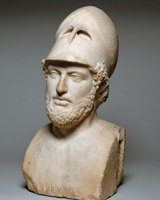
Athenian general in the fifth century BC. Statesman credited with expanding the city-state’s democracy. Proponent of sea power.
A lion’s roar
According to Greek historian Herodotus, when Pericles’s mother was pregnant, she dreamed she was going to give birth to a lion, a symbol of greatness.
Bold in battle
Pericles came to power around 460 and directed Athens in several wars. Though he feared shedding the blood of his men needlessly, the historical record suggests he personally took great risks in combat. He was “the most conspicuous of all in taking no care for his safety,” the historian Plutarch wrote of one fight.
Soldiering bloodline
It’s believed that Pericles’s father, Xanthippus, fought in the Battle of Marathon in 490. In 479, Xanthippus commanded the Athenian forces that won at Mycale (in modern Turkey), one of two decisive victories that drove the invading Persians from Greece. Pericles’s bastard son, Pericles the Younger, was elected an Athenian general decades after his father’s death and helped spearhead a naval victory over Sparta in the 406 Battle of Arginusae.
Trade as weapon
Sometime around 430, Athens banned traders of Megara, a longtime enemy, from its markets and ports—a first-of-its-kind peacetime trade embargo that was Pericles’s idea, according to biographer Donald Kagan.
Pericles at sea
The general put the most faith in his vaunted fleet. “He was at heart an admiral,” says military historian Victor Davis Hanson
Helmet head
Most busts and statues of Pericles show him wearing a helmet. Some histories suggest he was embarrassed by his large, elongated head.
Pericles at Gettysburg
When famed orator and Greek Revival leader Edward Everett spoke at the dedication of the Gettysburg cemetery in 1863, he quoted from Pericles’s well-known Funeral Oration, delivered after the first battles of the Peloponnesian War (431–404 BC) in honor of the dead Athenian warriors. President Lincoln’s Gettysburg Address doesn’t mention Pericles, but it draws on the same themes the Greek leader did.
The name lives on
A 2007 mission to capture suspected al-Qaeda fighters in the Iraq province of Diyala was code-named Operation Pericles—reportedly because one of its commanders loved Greek history.

